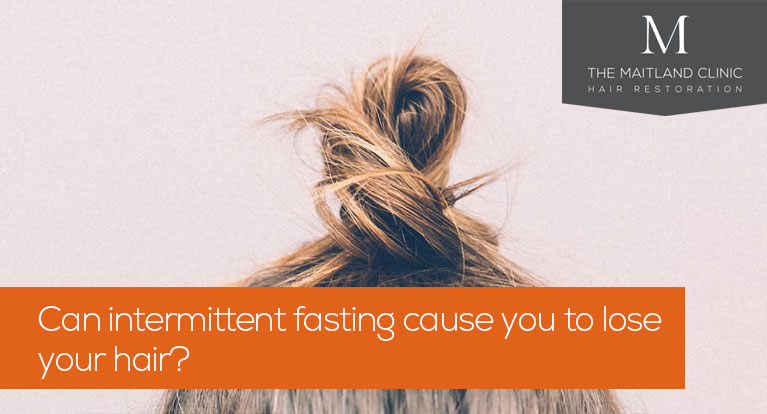Can intermittent fasting cause you to lose your hair?
25th October 2023

Intermittent fasting is a popular dietary strategy that involves restricting calorie intake to specific periods of time. Its advocates claim that it can aid weight loss and improve overall health. However, while there are many benefits, some people believe it can have a negative impact on hair growth. With this in mind, a common question we’re asked at The Maitland Clinic is, ‘can intermittent fasting cause you to lose your hair?’
There is some anecdotal evidence and a theoretical possibility that intermittent fasting might increase the risk of hair loss, particularly if adequate nutrition is not maintained, but robust scientific studies are still needed to establish a direct causal link between fasting and hair shedding. However, if you experience hair loss while practising intermittent fasting, it is recommended to consult a healthcare professional to identify and address any underlying causes.
While there is currently no robust scientific evidence to establish a causal link between intermittent fasting and hair loss, it is important to maintain adequate nutrition during intermittent fasting to reduce the risk of hair loss and other health problems.
What is intermittent fasting?
Intermittent fasting is when you restrict your calorie intake to particular periods of time. There are different methods of intermittent fasting but they all require you to alternate between periods of eating and fasting. Although the approach is somewhat controversial, studies suggest that giving your digestive system a break can improve gut health and help you lose weight.1, 2, 3, 4
The 5:2 and 16:8 are two of the most popular types of intermittent fasting. The former allows you to eat normally for five days and then fast for the remaining two. During the fasting days, you restrict your food intake to between 500 and 600 calories. Meanwhile, the 16:8 schedule involves limiting your food intake to an 8-hour window and then fasting for the remaining 16 hours.
While there are potentially many health benefits, intermittent fasting isn’t suitable for everyone and you should always consult a healthcare practitioner if you have any health concerns.
Is there evidence that intermittent fasting causes hair loss?
People will ask “can fasting make you lose your hair?”, and here’s our answer: There are no robust scientific studies establishing a causal link between intermittent fasting and hair loss. There is anecdotal evidence of a link – and you may have read stories on the internet from people who have experienced hair loss while on an intermittent fasting diet. However, these anecdotal reports do not provide conclusive evidence of a causal relationship between intermittent fasting and hair loss. Other factors, such as stress, underlying health conditions, or dietary deficiencies, could be contributing to hair loss in these cases, with the diet playing no significant role.
Why might intermittent fasting cause hair loss?
While there is no established scientific evidence specifically addressing the relationship between intermittent fasting and hair loss, there is a theoretical possibility of a causal link. To understand why, it is important to consider the potential factors that may contribute to hair loss in general.
To minimise the risk of hair loss while practising intermittent fasting, it is recommended to avoid extreme forms of fasting and follow a more moderate plan, such as the 16:8 approach.3 It is also important to focus on nutrition and ensure a balanced diet that includes essential nutrients for hair growth, such as protein, iron, and vitamins).3 Minimising stress through practices like yoga, meditation, or mindfulness can also be beneficial.3
Nutritional deficiencies, including deficiencies in essential fatty acids, can contribute to hair loss5, so any dietary practice that leads to fatty acid deficiencies could potentially have an impact. However, there is currently no evidence to suggest that intermittent fasting specifically leads to these deficiencies.
Weight loss itself can sometimes be associated with hair loss. Sudden weight loss and protein efficiency can be a cause of telogen effluvium – a type of temporary hair loss that occurs when the body experiences some form of metabolic stress or hormonal change.6
There is no specific evidence linking intermittent fasting with this kind of hair loss – but to minimise the risk it is wise to ensure that any weight loss achieved through intermittent fasting is gradual and sustainable.
Another reason why intermittent fasting might cause hair loss is the relationship between stress and hair loss. Stress-induced hair loss involves multiple factors: psychological, metabolic and hormonal. A sudden change in diet or an extreme diet that causes stress could therefore contribute to hair loss in susceptible individuals. Once more however, there is currently no direct scientific evidence of a causal link between intermittent fasting, stress and hair loss. If someone experiences hair loss while practising intermittent fasting, it is important to consider that the diet may not be the sole cause, and there may be other underlying factors contributing to the hair loss.5
How do I stop hair loss from intermittent fasting?
In terms of potential interventions to stop hair loss during intermittent fasting, there are currently no specific recommendations or interventions supported by scientific evidence.
However, if you want to try intermittent fasting but you’re worried about the impact on your hair, there are general strategies that can promote hair health. These include:
- Avoid extreme forms of fasting – stress or nutritional deficiencies may increase the chances of experiencing hair loss, so avoid extreme fasting and consider following a more moderate plan such as the 16:8 approach. Many people also find this option the most practical and easiest to stick to.
- Focus on nutrition – for healthy hair – and good health generally – make sure you have a balanced diet that includes essential nutrients for hair growth, such as protein, iron, and vitamins.
- Minimise stress – intermittent fasting can increase stress levels in the body, so consider taking up yoga, meditation or other mindfulness practices to help you relax and manage the extra stress.
- Consider taking a hair supplement – although there’s little scientific evidence to prove hair vitamin supplements can prevent hair loss – and certainly not on their own – reputable hair supplements may support hair health. Supplements alone may not prevent hair loss and should be used as part of a holistic treatment approach. Always consult a medical professional before taking hair care supplements, especially if you’re on other medication.
- Practise good scalp hygiene – and avoid excessive heat styling and chemical treatment, which can affect hair health.
Above all, if you are considering starting an intermittent fasting diet and are concerned about hair loss or any other effects, speak to a healthcare professional about whether it is a suitable diet for you.
What to do if you’re worried about hair loss
If you have experienced hair loss while on an intermittent fasting diet, it is important to consider that the diet may be just one cause – or may not be a cause at all. There are many other, evidenced causes of hair loss or poor hair growth.7, 8 If you are concerned about hair loss, speak to a healthcare professional to identify and address any underlying causes.
At The Maitland Clinic, we help patients with various types of hair loss. Whether your hair loss is temporary or permanent, our highly-trained team of haircare experts can advise you on the best course of action. Depending on your condition and the extent of the hair loss, this may involve diet and lifestyle changes, medication, laser therapy, platelet-rich plasma injections or a hair transplant.
To find out more, or if you are interested in undergoing hair loss treatment at The Maitland Clinic, contact us to arrange a consultation.
References
- De Cabo R and Mattson MP. Effects of intermittent fasting on health, ageing, and disease. New England Journal of Medicine. 2019;381(26):2541-2551. doi: 10.1056/NEJMra1905136. https://www.nejm.org/doi/full/10.1056/nejmra1905136
- Patterson, R. E. and Sears, D. D. (2017). Metabolic effects of intermittent fasting. Annual Review of Nutrition, 37(1), 371-393. https://doi.org/10.1146/annurev-nutr-071816-064634
- Toledo, F. W. d., Grundler, F., Sirtori, C. R., & Ruscica, M. (2020). Unravelling the health effects of fasting: a long road from obesity treatment to healthy life span increase and improved cognition. Annals of Medicine, 52(5), 147-161. https://doi.org/10.1080/07853890.2020.1770849
- Templeman, I., Gonzalez, J., Thompson, D., & Betts, J. (2020). The role of intermittent fasting and meal timing in weight management and metabolic health. Proceedings of the Nutrition Society, 79(1), 76-87. doi:10.1017/S0029665119000636. https://doi.org/10.1017/s0029665119000636
- Guo, E. and Katta, R. (2017). Diet and hair loss: effects of nutrient deficiency and supplement use. Dermatology Practical & Conceptual, 1-10. https://doi.org/10.5826/dpc.0701a01
- Mubki T, Rudnicka L, Olszewska M, Shapiro J. Evaluation and diagnosis of the hair loss patient: part I. History and clinical examination. J Am Acad Dermatol. 2014;71(3):415.e1–e415.e15. https://www.sciencedirect.com/science/article/abs/pii/S0190962214014364
- Almohanna HM, Ahmed AA, Tsatalis JP, Tosti A. The Role of Vitamins and Minerals in Hair Loss: A Review. Dermatol Ther (Heidelb). 2019 Mar;9(1):51-70. doi: 10.1007/s13555-018-0278-6. Epub 2018 Dec 13. PMID: 30547302; PMCID: PMC6380979.https://www.ncbi.nlm.nih.gov/pmc/articles/PMC6380979/
- Walter K. Common Causes of Hair Loss. JAMA. 2022;328(7):686. doi:10.1001/jama.2022.12461. https://jamanetwork.com/journals/jama/article-abstract/2795266










